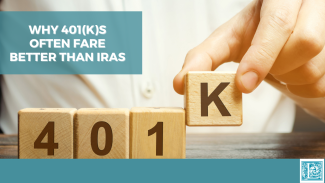
Why 401(k)s Often Fare Better than IRAs
Despite the challenging market conditions, 401(k) balances often fare better than IRAs, providing a little more hope for retirement investors.
Here are 5 reasons why:
Automatic Contributions
One of the primary reasons why 401(k) balances often fare better than IRAs is due to automatic contributions. Many 401(k) plans have automatic payroll deductions, which mean that employees are consistently contributing to their retirement accounts, even during times of market volatility.
This consistent contribution can help to offset any losses in the market, as investors are buying stocks at lower prices, which can eventually recover over the long term.
Limited Investment Options
Another reason why 401(k) balances often fare better than IRAs is due to limited investment options. Many 401(k) plans have a limited number of investment options, which can help to prevent investors from making emotional decisions during times of market volatility.
Additionally, some 401(k) plans have automatic rebalancing, which means that investments are regularly adjusted to maintain a specific risk level, reducing the risk of significant losses.
Employer Contributions
Employer contributions are another factor that contributed to the resilience of 401(k) balances. Many employers offer matching contributions, which means that for every dollar an employee contributes to their 401(k), the employer will also contribute a certain amount, up to a certain limit.
These matching contributions can help to offset any losses in the market and provide a boost to retirement savings.
Tax Benefits
Another advantage of 401(k) plans is the tax benefits they offer. Contributions to a 401(k) plan are made on a pre-tax basis, which means that the money is deducted from an employee's paycheck before taxes are taken out. This can lower an employee's taxable income, which can reduce their tax liability.
Additionally, 401(k) plans allow for tax-deferred growth, which means that any earnings on the investments within the plan are not taxed until they are withdrawn.
Limited Withdrawals
Finally, 401(k) plans typically have limited withdrawal options. While this can be frustrating for some investors who may need access to their retirement savings, it can also help to prevent investors from making emotional decisions during times of market volatility.
Additionally, 401(k) plans typically have penalties for early withdrawals, which can discourage investors from withdrawing funds prematurely.
You Decide
Planning for retirement can bring complicated issues that require expert advice.
· Find a financial professional who knows how to deal with these types of issues.
· Find a financial professional who knows the ins and outs of financial planning.
· Find a financial professional who accounts for historical inflation when modeling out your portfolios over time.
· Find a financial professional who understands how emotions can derail your investing decision-making.
· Find a financial professional who understands your goals.
Then make an informed decision and work with your financial professional to help you build a custom–tailored financial plan.
Important Disclosures
The opinions voiced in this material are for general information only and are not intended to provide specific advice or recommendations for any individual. To determine which investment(s) may be appropriate for you, consult your financial professional prior to investing.
Investing involves risks including possible loss of principal. No investment strategy or risk management technique can guarantee return or eliminate risk in all market environments.
Contributions to a traditional IRA may be tax deductible in the contribution year, with current income tax due at withdrawal. Withdrawals prior to age 59 ½ may result in a 10% IRS penalty tax in addition to current income tax.
Rebalancing a portfolio may cause investors to incur tax liabilities and/or transaction costs and does not assure a profit or protect against a loss.
This information is not intended to be a substitute for specific individualized tax advice. We suggest that you discuss your specific tax issues with a qualified tax advisor.
This article was prepared by FMeX.
LPL Tracking #1-05363208

